300 Years Neudeggerhof . 30 years organic wine. Winemaker’s comment
Introducing Johahn – PIWI.
We grow PIWI-varieties because we believe in its positive impact on biodiversity. He continuously reminds us to implement sustainability in our everyday lives and therefore, he deserves his own wine: A ‘PIWI‘-based, unfiltered white wine blend named after him. Johahn shows his excitement by crowing in all possible languages. Emphasizing his beliefs that in acting together, we can make a difference in the world.
But how did it come about in the first place?
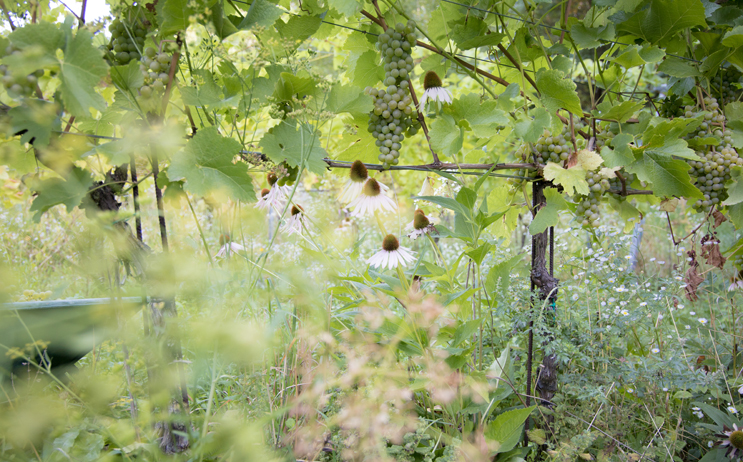
As a winemaker, entrepreneur and family man, I naturally think about how tasks can be tackled better and more efficiently. The biggest challenge in the vineyard is still plant protection. This is especially true for old varieties such as Grüner Veltliner, Roter Veltliner and Riesling. Therefore, about twelve years ago, I decided to plant PIWI varieties: Muscaris, Johanniter and Bronner now form the basis for our Johahn wine. How did it come about?
How organic is organic?
The thought of organic is all about nature – of everything growing and thriving on its own. Unfortunately, this is often not the case. Our biggest challenge in organic vineyards is that conventional grape varieties are not resistant to fungal diseases. In particular, powdery mildew (Oidium), as we also know it on roses, and downy mildew (Peronospora) can cause massive yield losses Therefore, we are not spared to use net sulphur, potassium bicarbonate (baking powder), orange oil or even copper.
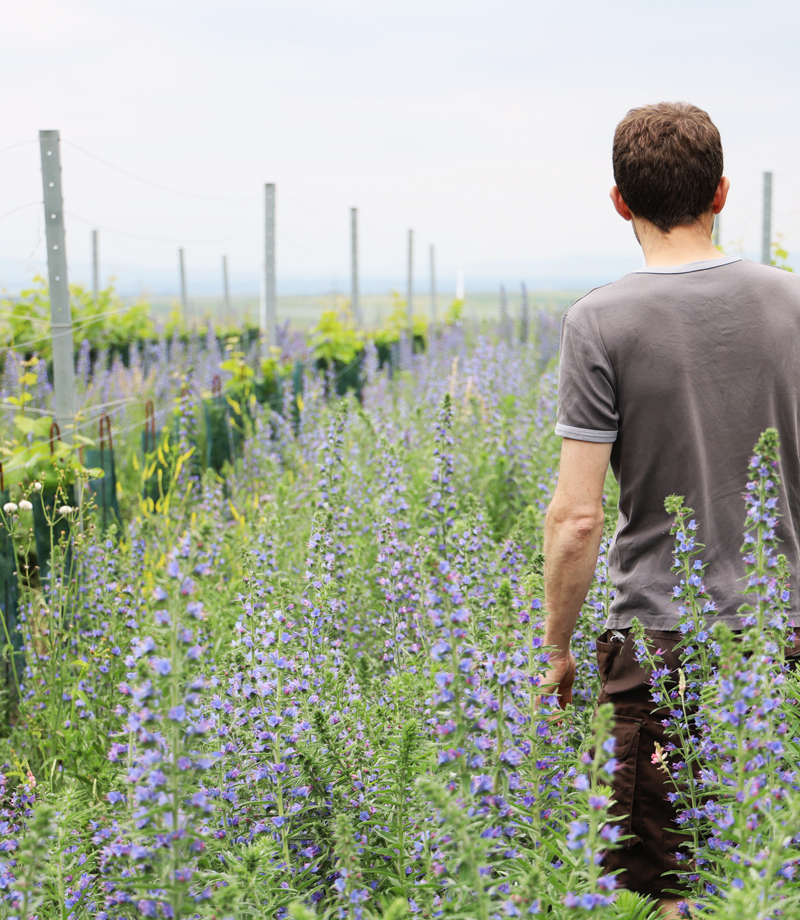

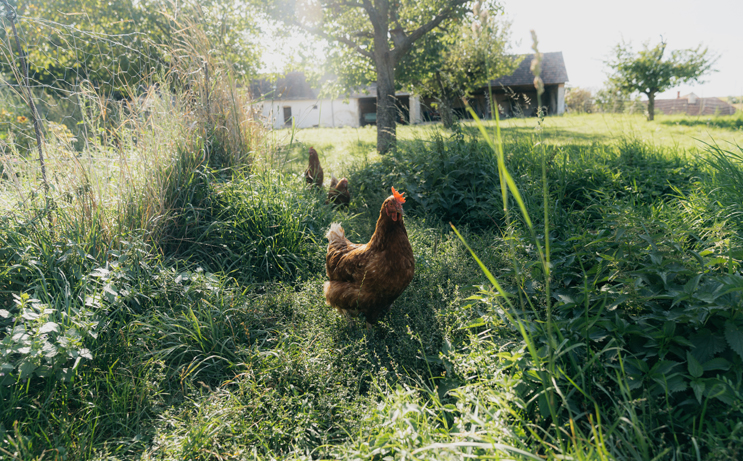

PIWI = PIlzWIderstandsfähig = fungus-resistant
Thanks to science, however, new varieties have been bred in recent decades that are more resistant to fungal diseases, so-called fungus-resistant (PIWI) varieties. What does this mean for plant protection in the vineyard? With conventional grape varieties, such as Grüner Veltliner, seven to eleven spraying cycles take place per year, depending on the weather. With PIWI varieties (such as Muscaris, Johanniter or Bronner), this number can be greatly reduced: In challenging vintages, up to three sprays are carried out, in good years it may even be that no plant protection needs to be applied at all!
PIWI varieties are created – very simply put – by crossing European vines with American vines (which are fungus-resistant) through pollination. Through continuous selection, first in the glasshouse, then in experimental quarters and finally outside at the winemaker’s, these new varieties are checked for a wide range of characteristics and gradually selected. This means that a new grape variety should not only be resistant, but must also be frost-proof, yield-proof, etc. And the most important thing, of course, it should taste well. The selection of PIWI varieties is a process that takes about three decades.
Johahn - the wine
Johahn does not only stand for thinking in generations (after all, the first Mehofer we know from our ancestors was called Johann, the rooster has also adorned our family coat of arms for centuries), as a rooster in the winery it is today a symbol for the coexistence of animals and humans, and for the fact that we can only preserve our planet together and across borders. Finally, Johanniter is one of the three grape varieties that currently determine our wine Johahn. It gives the wine freshness and acidity. Muscaris gives Johahn its distinctive aroma and the Bronner variety determines the finish and volume of the flavour. All three varieties are harvested together (cf. Gemischter Satz) and fermented with our own yeasts. After malolactic fermentation and several months of maturation on the fine yeast, the wine is lightly sulphured in stainless steel tanks. Our Johahn is then bottled unfiltered. Purely natural.
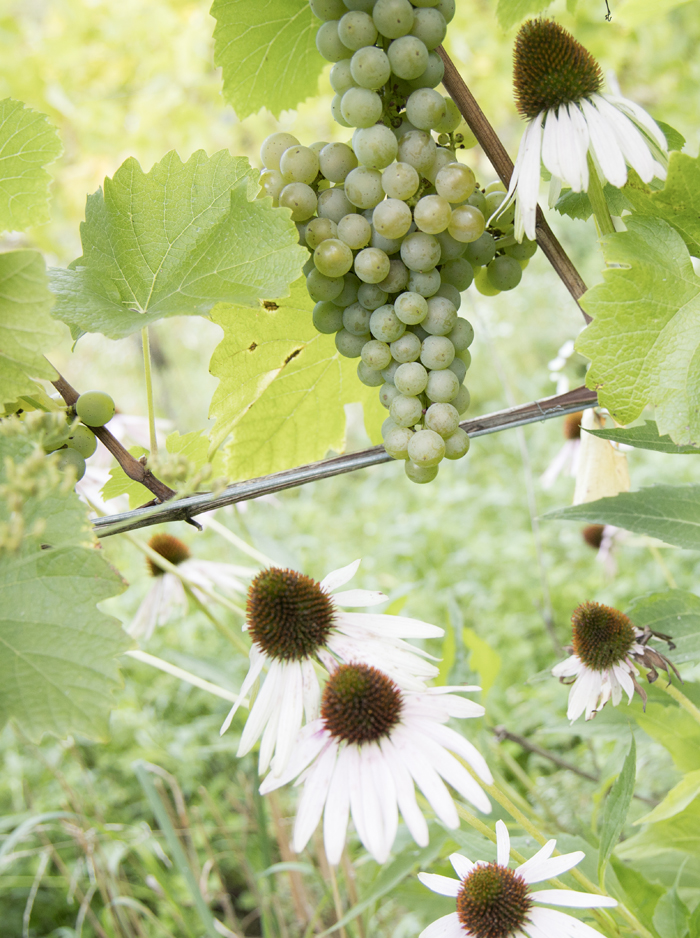

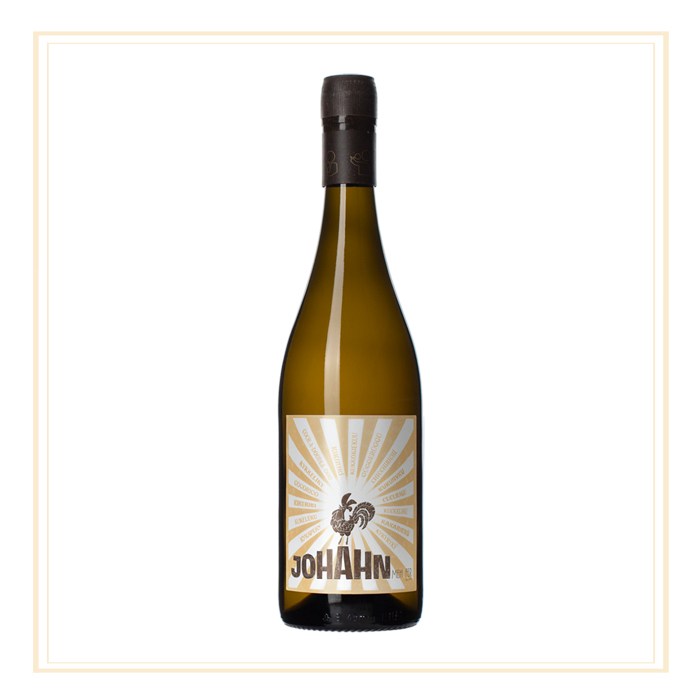

Challenge and Potential
In my experience, the challenge of new, sustainable varieties is first and foremost, awareness. Everyone knows Grüner Veltliner, so there is no need to explain it. However, the new varieties are not yet anchored in the minds of the customers and have to be communicated intensively. On the other hand, even as a winemaker you first have to “familiarise” yourself with the new varieties. How does the plant react to the soil or the climate and when is the right time to harvest? With Grüner Veltliner you already know all that.
I have planted PIWI varieties because I am convinced that they make sense for the future and represent an important contribution to long-term, sustainable management.
Less plant protection does not only mean less pesticides and thus more biodiversity and health, but less plant protections also means fewer passes in the vineyard and thus less CO2 emissions and less soil compaction.
So: Please tell the others – cock-a-doodle-dooooo!
Fun Fact | Polyglott Johahn
- kikeriki (de, si, est)
- cock-a-doodle-doo (e)
- cocorico (fr)
- kukuryku (pl)
- кукареку (ru, bru)
- kuckeliku (se)
- quiquiriquí (es)
- kykkeli-ky (dk)
- kykkeliky (no)
- kukeleku (nl)
- kukurikú (hu)
- chicchirichi (it)
- güggerügü (ch)
- kikirikí (sk)
- cucurigu (ro)
- kukurigoo (bu)
- кукурику (bu, ku)
- kukkokiekuu (fin)
- kykyryký (cz)
- kukuriku (bos, cro, bu, uk)
- gaggalagú (ice)
- kakariekū (lit, let)
Because sustainable actions make much more sense together than alone.


